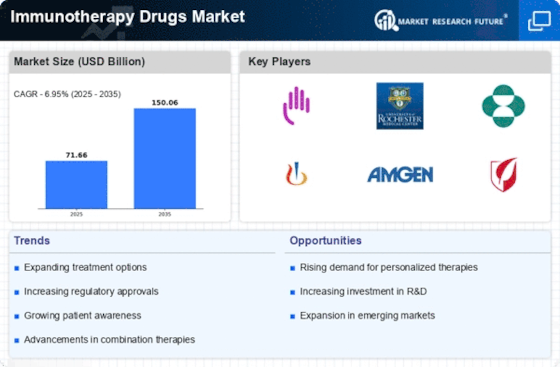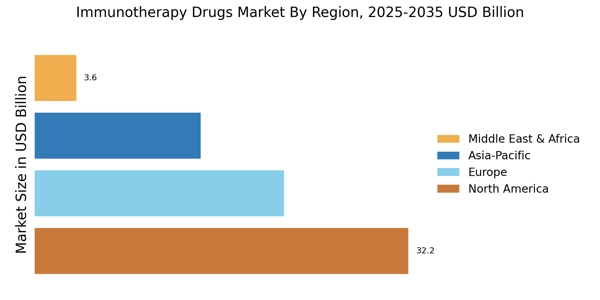Increasing Cancer Incidence
The rising incidence of cancer worldwide is a primary driver for the Immunotherapy Drugs Market. As cancer cases continue to escalate, the demand for innovative treatment options grows. According to recent statistics, cancer is projected to affect approximately 1 in 3 individuals during their lifetime. This alarming trend necessitates the development and approval of new immunotherapy drugs, which are designed to harness the body's immune system to combat cancer. The Immunotherapy Drugs Market is responding to this need by investing in research and development, leading to a surge in novel therapies. Furthermore, the increasing awareness of immunotherapy's potential benefits among healthcare professionals and patients is likely to enhance market growth, as more individuals seek out these advanced treatment modalities.
Growing Investment in Cancer Research
The Immunotherapy Drugs Market is witnessing a surge in investment aimed at cancer research and development. Governments and private entities are increasingly allocating funds to support innovative therapies that target various cancer types. In recent years, funding for cancer research has reached unprecedented levels, with billions of dollars being invested annually. This influx of capital is facilitating the exploration of novel immunotherapeutic approaches, including CAR T-cell therapy and immune checkpoint inhibitors. As a result, the Immunotherapy Drugs Market is likely to expand, with more drugs entering clinical trials and subsequently gaining regulatory approval. This trend not only enhances treatment options for patients but also fosters a competitive landscape among pharmaceutical companies, driving further advancements in immunotherapy.
Regulatory Support for Innovative Therapies
Regulatory bodies are increasingly providing support for the development and approval of innovative therapies within the Immunotherapy Drugs Market. Initiatives aimed at expediting the review process for breakthrough therapies are encouraging pharmaceutical companies to invest in immunotherapy research. For instance, programs such as the FDA's Breakthrough Therapy Designation are designed to facilitate the development of drugs that demonstrate substantial improvement over existing treatments. This regulatory support is likely to enhance the speed at which new immunotherapy drugs reach the market, thereby benefiting patients in need of effective treatments. As more therapies gain approval, the Immunotherapy Drugs Market is expected to experience robust growth, driven by the introduction of novel and effective treatment options.
Technological Advancements in Drug Development
Technological advancements play a crucial role in shaping the Immunotherapy Drugs Market. Innovations in biotechnology, genomics, and bioinformatics have significantly accelerated the drug development process. For instance, the advent of next-generation sequencing has enabled researchers to identify specific biomarkers that can predict patient responses to immunotherapy. This precision medicine approach is likely to enhance the efficacy of treatments, thereby attracting more investment into the Immunotherapy Drugs Market. Additionally, the integration of artificial intelligence in drug discovery is streamlining the identification of potential drug candidates, reducing time and costs associated with bringing new therapies to market. As these technologies continue to evolve, they are expected to drive the development of more effective immunotherapy drugs, further propelling market growth.
Rising Awareness and Acceptance of Immunotherapy
The growing awareness and acceptance of immunotherapy among healthcare providers and patients are pivotal drivers for the Immunotherapy Drugs Market. Educational initiatives and successful case studies have contributed to a better understanding of how immunotherapy works and its potential benefits. As more patients become informed about their treatment options, the demand for immunotherapy drugs is likely to increase. Furthermore, endorsements from oncologists and healthcare professionals are fostering trust in these therapies, leading to higher adoption rates. This shift in perception is crucial, as it encourages pharmaceutical companies to invest in the development of new immunotherapy drugs, thereby expanding the market. The Immunotherapy Drugs Market is poised to benefit from this trend, as increased acceptance translates into higher sales and market growth.

















